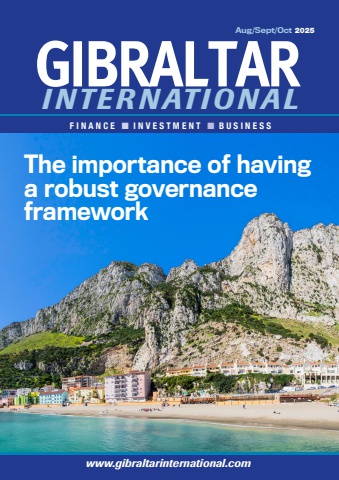Being disruptive
By Marcus Killick, Isolas
Last month in London I caught my first Uber “cab”. It arrived quickly, delivered me exactly where I wanted to go and I stepped from the rear door without reaching for my wallet, having paid with Paypal. For my return journey on the tube I skipped the queue for the ticket machine, put my contactless debit card next to the scanner at the ticket barrier and passed through in a fraction of the time it had taken a few months earlier. Welcome to the new world of disruptive technologies.
Look around, they are everywhere. Airbnb can find you a bed for the night. Instagram can end your political career. Twitter can prove how dull your life is to strangers as well as friends. Yet within this surge many mainstream international financial services centres remain trapped in a rut. Products and services are tinkered with, incremental improvements are made. Yet we were once in the vanguard of new initiatives. We were the disruptive technology of our time. Just look at international business companies, asset protection trusts and funds for experienced and sophisticated investors, to name but a few.
So what happened?
Firstly we became a victim of our success. Why change and develop when what we had was so profitable? Understandable, but flawed, just ask MySpace (or Jeeves) about that one. Secondly, in the face of an onslaught of mostly inaccurate and bias criticism we became introspective and defensive. We have sought to become whiter than white by avoiding risk rather than understanding and managing it.
The result is that, to a certain extent we have lost our edge. Yet as centres we are, by our very nature, capitalist and free market. This makes us part of the system that has proved to be the most adaptive and innovative in the history of mankind. Surely it is time to return to these roots and regain our position as vanguard.
Yes, on occasions companies and trusts were used inappropriately and illegally. Banks are sometimes used, both on and offshore for money laundering. Bad people do bad things and it is in all our interest to stop them where we can. But the system itself is not flawed, nor is it evil. It is simply sometimes misused. To claim otherwise is like blaming drink driving on General Motors simply because they manufactured the car.
So, how do we achieve this? Firstly let’s stop being scared of innovation. That includes the industry itself, as well as Governments and regulators. For example, I don’t understand how my ipad works, but I am not scared of it. This is not my advocacy for regulatory ignorance, rather our reaction should not be Pavlovian to all that is new. Secondly let us look towards where the next disruptive technology is likely to come from and look to support it.
Gibraltar has two obvious examples of how this can be achieved, one historic and one current. Historically it was one of the first smaller finance centres to encourage the online gaming community. By focusing on the quality rather than the quantity of licensees it quickly attracted some of the largest players in the industry, attracted by a favourable tax environment and an increasing skilled workforce. Gibraltar was also able to provide a regulatory environment robust enough to give protection from reputational risk whilst approachable enough to ensure that bureaucratic over regulation was avoided. The result, a new sector of the economy providing large numbers of jobs and that has proved remarkably resilient to outside economic factors. One could point to the insurance sector in Bermuda to see a similar success story and the smaller international finance sector is dotted with such examples where innovation has led to dominance. But these cases are less frequent than before.
So where now?
By our very nature we are dependent on servicing customers beyond our shores. We are therefore generally reactive and responsive, not simply to events but also to possibilities. One such possibility is now in the world of cyber payments and virtual currencies (a report by Boston Retails found that around 8% of US retailers intend to start accepting Bitcoin as payment in 2016).
Many of us are used to paying for our goods and services online. Despite the numerous scare stories and the occasional loss of privacy (Ashley Madisson being the most recent embarrassing example), the overwhelming majority of payments occur smoothly, efficiently and with the expected level of confidentiality. It is sometimes forgotten that the older methods of payment were hardly risk free. Cheques could be stolen, wallets with cash lost and credit cards cloned.
Yet every innovation carries the fear of the unknown. Bitcoin is poorly understood by most. The idea of mining for currency, of an anonymous creator, of failures like Mt Gox, of wildly fluctuating values, all give legitimate cause for nervousness. Yet, whilst, the fear of virtual currencies is understandable they do represent a potentially massive new area in financial services. The sooner their risk is managed the sooner their potential can be unleashed. And where better to do it in the crucible of financial innovation, the international finance centres.
Time is short to achieve this. For example, the UK Treasury has announced a series of initiatives dealing with digital currency in a report which was published in conjunction with the Chancellor of the Exchequer’s annual budget in 2015. The report stated that;
“The government considers that digital currencies represent an interesting development in payments technology…the potential advantages are clearest for purposes such as micro-payments and cross border transactions.”
The UK is also considering the development of a “regulatory sandbox” for financial technology companies where entrepreneurs could test ideas and concept technologies in a lightly regulated environment with the informed consent of customers. Whilst the word “sandbox” makes it sound more like a cat’s litter tray (isn’t “incubator” far less grating?), the fact this is happening now means that, unless we move quickly, another opportunity for the smaller centres to shine may be lost.
I believe the initiative can best be gained by creating the best supportive and regulatory environment. This is one that promotes growth but which provides protection from unnecessary risk. Gibraltar has taken this approach, creating a working group on virtual currency, with support from Government, the regulator and the industry. Part of its aim is to look at what the features of a regulatory framework for virtual currency should be and, through this enable the jurisdiction to be a benchmark, attracting high quality virtual currency business.
The aim is clear, to establish criteria for establishing a business in the jurisdiction, assisting those that meet them and acting as a barrier to entry for those that don’t. It will not simply be a veneer of registration or one that simply focuses on AML criteria but one that provides a comprehensive approach.
So how might this framework look?
Firstly, there would be primary legislation establishing the requirement to be authorised, the scope of area to be covered and the powers and duties of the regulator.
Secondary legislation will then set out the process for licensing and the prudential and conduct of business requirements. These in turn are supported by Codes of Practice.
There is nothing in the framework that is unfamiliar to any financial entity currently within a regulated environment. However, a key decision that needs to be made is whether existing regulatory regimes can be adapted to include this area or a new regulator should be created. In doing so the costs of establishing a new regulator need to be considered as does whether the skill sets of the existing regulator can be adapted to meet the challenges of virtual currencies. Regulatory culture has also to be factored in; regulators can nurture new areas (as Gibraltar did with gaming) or kill them. Will the regulator be dynamic or inert? Will its existing workloads, prevent it from giving this area sufficient individual attention? These are fine, value judgements, but vital ones.
Any regulatory environment costs. If it is too expensive, or requires huge internal costs for the regulated entity, then the sector will never grow. It is therefore, almost inevitable that some costs will be met, in the early stages, from the public purse. Government therefore will need to decide is the long term value of the new business worth the short term costs, when set against other spending priorities and wishes.
Regarding scope, the focus should be on the key risk areas, therefore exchanges, wallet providers and transmitters. There also needs to be consideration of what virtual currencies should actually be within scope. Should it just be decentralised ones (e.g. Bitcoin) or also cover centralised ones which have a single administrating authority (i.e. a third party that controls the system such as Linden dollars). Should non-convertible virtual currencies also be covered?
Virtual currencies are not the only arena the international finance centres can make a valuable, constructive and significant contribution to. The development of P2P platforms, crowd funding and other areas of disintermediation also present opportunities. We sit on a tipping point in the evolution of financial services across the world. Let us make sure we are on the mammal rather than dinosaur side of it.





